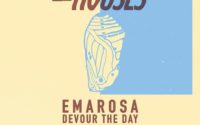Exclusive Interview: Bloodshot talk writing and recording!
When it comes to the Death Metal crunch, there are more than a few hidden gems. One of those that shimmers in the darkness with a fine blend of Groove, Death and Thrash is Oxford quartet Bloodshot, who established themselves in 2016 with influences from the 90’s scene and haven’t looked back since. Twice victorious at Rabidfest in 2019 and 2021, the bands return in July with single “Dead Horizons” is one to be savoured, while September has brought us a second in “Demarcation” and they say they have more new music in the pipeline! Our second conversation with them in seven days finds us discussing what goes into their writing and recording sessions…
How did your previous experiences writing and recording help to smooth the path of the new record? “From the beginning we’ve always wanted to prove something about ourselves; both in the writing and recording. We’ve always loved great productions from any year of metal; we understand how important it can be for a band when an EP or album comes out, and we hope our releases capture both the attention of its demographic and higher ups within the music industry! We learnt a lot about what works for us in the studio and also learnt the value of time when recording. We actually pushed the recording back by a few months to ensure that we were 100% on it before stepping foot in the studio – ultimately, it’s your money and everyone’s time that you risk wasting if you’re recording a track you’re not confident with every aspect of.”
How does the writing process of a new track start? Melody, riff or rhythm first? How does it evolve from there before you consider it the finished article? “Our vocalist and guitarist Mac is the main songwriter for band following COVID, and a typical workflow for writing is start with a riff and listen to what it could be. Is it an intro? Is it a verse? we always play that riff, record it, listen back and then figure out what should follow (kind of like the trend of getting an AI to expand a painting or famous piece of artwork) – we tend to get a blueprint for the track as it were and then play it over and over for the rest of the band. From there, everyone hears their own thing on it that we could do, drum fills, guitar layers, vocals etc. The track usually ends up being quite different to the original, and we sometimes change a song 2 months after we’ve even finished with it! Most songs follow this process, and it’ll be either Mac or Liam that starts off with the blueprint.”
As a band you’ve got a glowing reputation for your live performances; have you ever found it challenging to capture that live energy like lightning in a bottle in the studio without the audience to feed off? “We’re often just as excited to play the song in the studio as we are live in front of people. If we’re not excited to play the song and if we don’t love everything about playing it, we’ve done something wrong! Plus, listening back to your craft in its most perfected form in the studio is something else – just playing back a chorus we’ve recorded with the sound engineer and having everyone enjoy it is one of the best feelings, and that is more than enough fuel for us! Songs like Dead Horizons, and what’s soon to come, has followed a high level production that we have never considered before. Every note played on the guitar, every drum hit, every scream has been scrutinised while tracking; this is easily our most ambitious release to date.”
If you had the opportunity to work with a guest in the studio next time around, who would you like to work with and why? “Mac gets vocals lessons time to time from Rafał Piotrowski (vocalist for Decapitated), so being able to work with him on a track would be insane. We’re also big fans of Harbinger, so getting a guest appearance from Dilan Alves would likewise be pretty special. In a fantasy land, our bassist would love to work with Justin Chancellor (Tool’s bassist) or Les Claypool (Primus’ bassist)!”
For us gear nerds out there, can you tell us what you’re using gear wise (pedals, strings, drums etc) to get your sound? “Guitar wise we used a blend of both active and passive pickups in our guitars. An active set of 57 and 66 EMG humbuckers running into a Peavy 5150 with both the Maxon 808 OD and ST9 pro super tube as the main distortion channel. To quote Rob Barret from Cannibal Corpse, “It sounds like two guitars”. We also use the Dimebag Cry Baby wah and the Digitech Whammy 5th generation for solos. In terms of effects pedals we use both the Strymon Mobius for modulation and the Strymon Timeline for Delay. Guitar strings are D’Addario Medium’s 10-52 played in D standard tuning (and drop C for some other tracks).”
What difference would it make to you as a band if you could land an endorsement from a gear manufacturer? “It would make a huge difference to our music, it’d give us more opportunities to expand our gear with a brand that we all know and love, as well as be exposed to gear we perhaps wouldn’t normally use. We go with certain brands because we genuinely love their products – an endorsement isn’t a one-way street, it’s a give and take relationship. It would be great for all parties involved to be able to promote each other!”
Catch Bloodshot live
23/09 – Leeds, Boom – Mortal Metal Fest
30/09 – London, Unit 3 w/Feelshame, Swarmed, Virtorem, Away With The Seas
Fancy a Bloodshot tee? Get yours here!



